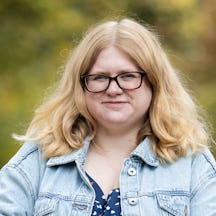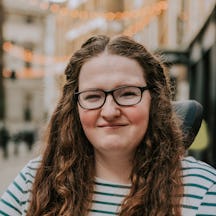Deep down, every parent wants their child to be a bit like them, to experience the world as they do themselves. Addressing her young son directly, Amy Kavanagh reflects on the pleasures of pregnancy and parenting as a blind mum, and on the bittersweet fact that her baby can see.
Pregnancy, parenting, and embracing blindness
Words by Amy Kavanaghphotography by Shona Louiseaverage reading time 6 minutes
- Article
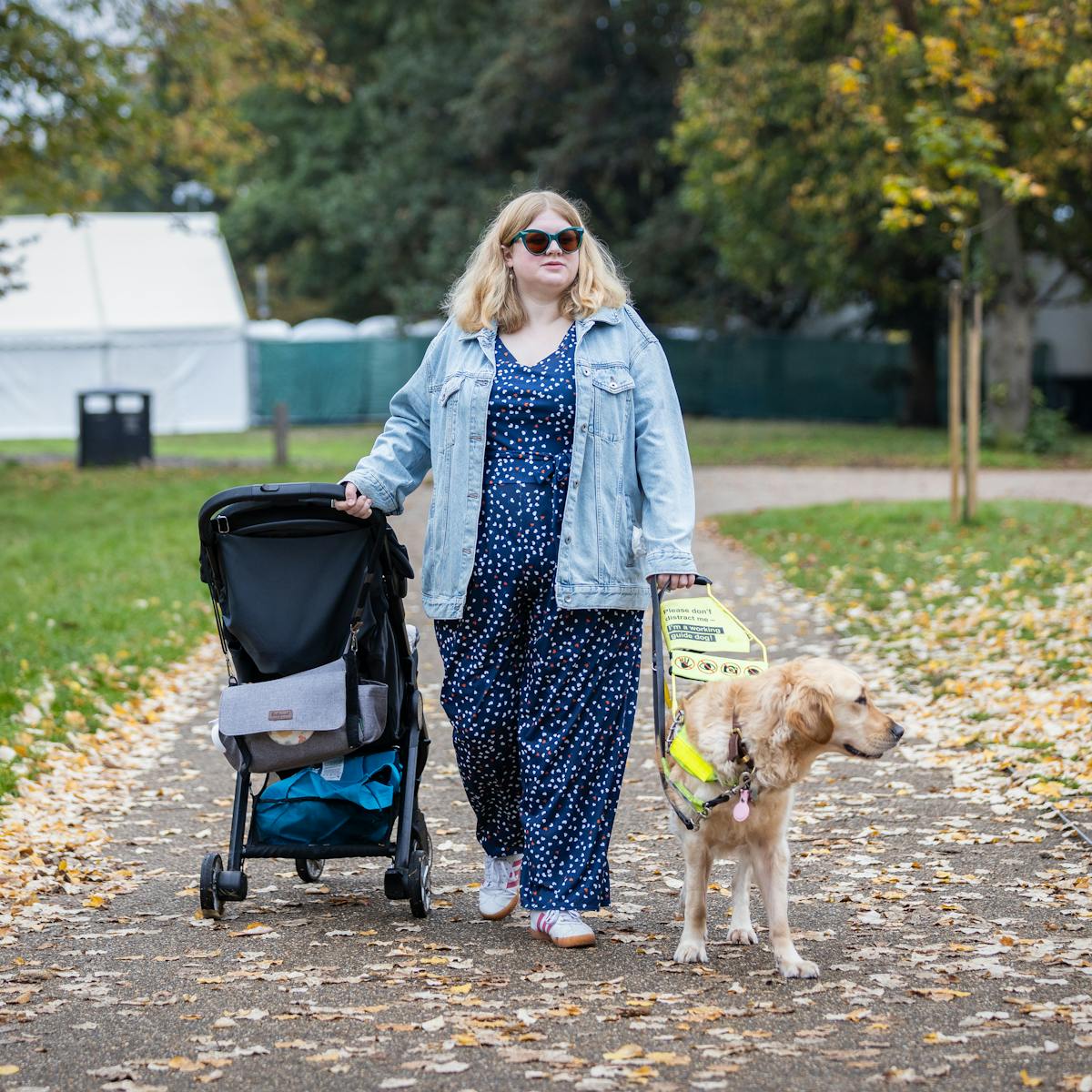
Cat! You shout it joyfully, sitting in your highchair, looking out into the garden, porridge in your hair. The same hair as mine, so bright and blonde that everyone mentions it when they first meet you.
“Cat! Cat!”
It’s one of your favourite, first words. I turn around to face the window, but it’s pointless. The wintery garden is a blur of green and grey and brown.
“Oh, is there a cat, my love?”
But you’re already more interested in spooning breakfast onto the floor.
It’s the third time this week you’ve seen something that I can’t. You’re experiencing a whole visual world that I’m simply not a part of. Yet the reason I feel sad sometimes is not because I’m blind, it’s because you can see.
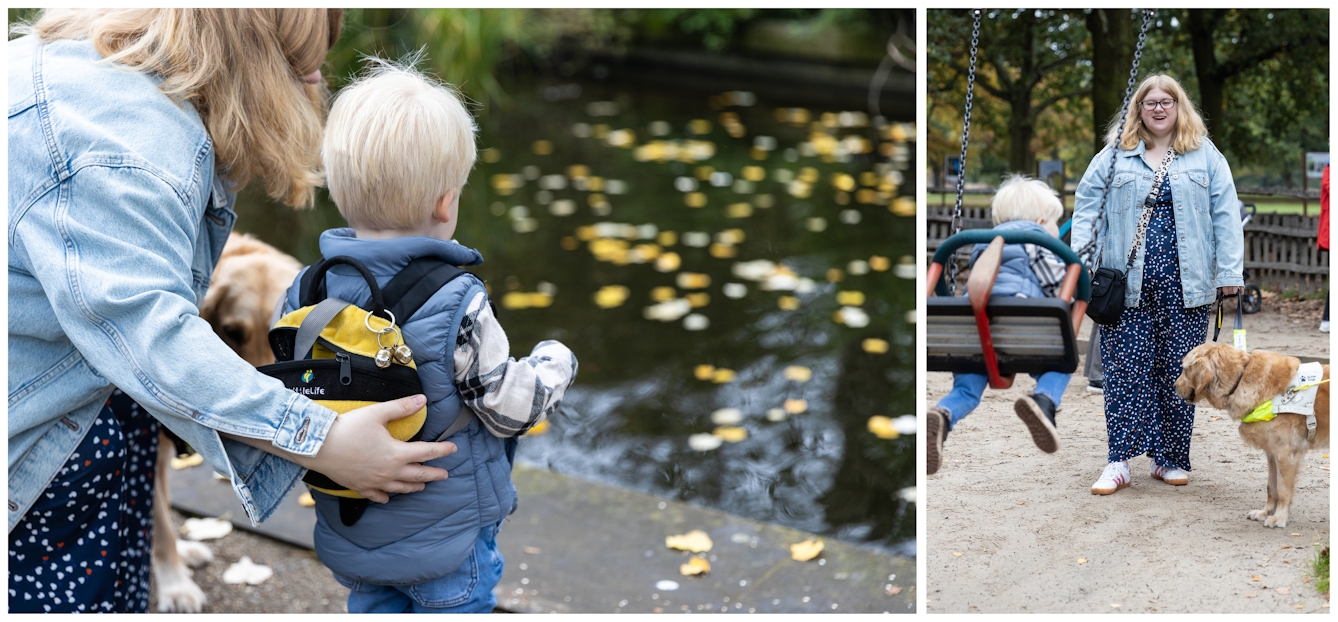
Navigating motherhood
I was born visually impaired, but it took 27 years for me to accept and eventually celebrate my blindness. That’s a story I’ll tell you another time.
Disability became my source of pride and strength, but there was one fearful shame left. An unkind voice would sometimes whisper in my head, “But what if you have a baby like you?” So I decided to shout the thought down, always repeating that a blind mother is the best parent for a blind child.
I enjoyed the scandal of being a visibly pregnant blind woman. As you grew and I swelled, it felt like we were challenging norms about sex, love and parenting.
Our pregnancy wasn’t easy and I spent a lot of time advocating for us both to get the care we deserved. I loved it, though. I loved your swirly, fishy movements, I loved your hiccups; I even loved your penchant for headbutting my bladder. I loved feeling like my body was powerful, beautiful and capable.
Then there you were. You entered the world in the first hour of the day, exhausted and quiet. When you cried, my whole body responded. I strained my eyes until they stung with pain, trying to take in every feature I could perceive.
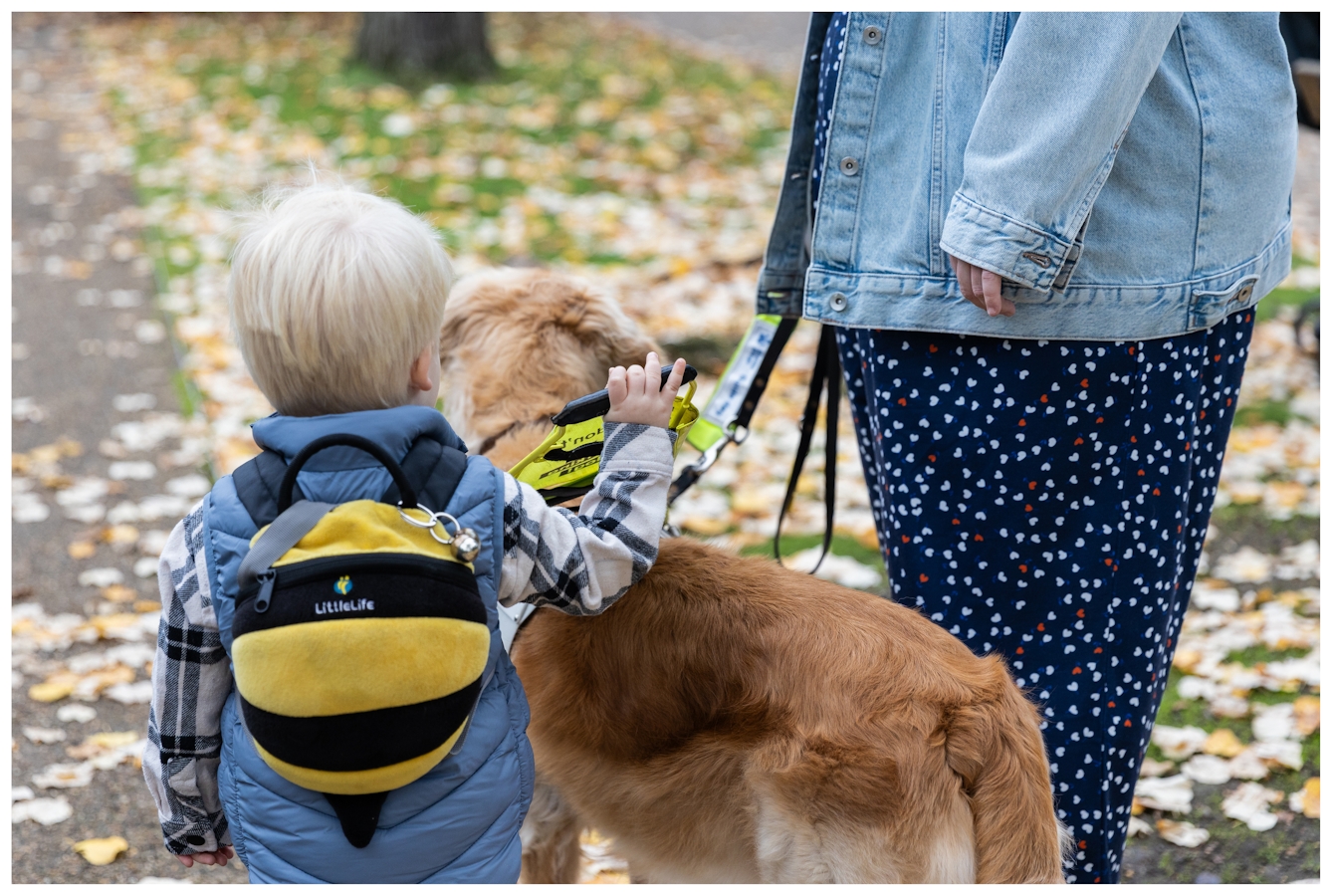
Then I found more joy understanding you with my other senses: your impossibly soft skin, that milky new smell, learning the sounds of your snuffles, squeaks and wails.
It’s true that babies don’t come with an instruction manual, and there certainly isn’t one for blind mums. I quickly found myself contending with a new layer of disabled admin, like working out how to give you the right amount of Calpol before your immunisations. After a chat with my trusty Facebook group of blind parents, I found scratching a tactile mark on the oral syringe was a simple solution. A lifetime negotiating accessibility barriers had prepared me pretty well for the workarounds of parenting.
There are also some great blind perks. Our breastfeeding journey was so special. I think it helped that I couldn’t see any judgemental stares or creepy looks when I fed you in public.
Now you’re walking, you wear bells on a little backpack. I often find you quicker by sound than your dad can by looking. You always turn up with guide dog Ava, which makes you very popular with your peers.
Most importantly, you will grow up surrounded by the love it takes to overcome the inequalities of an inaccessible world.
A shifting viewpoint
I’m very loudly and proudly your mum. We wear bright colours, roar with laughter and stamp around in puddles. It fills my heart when you introduce me to strangers as “silly Mummy!”.
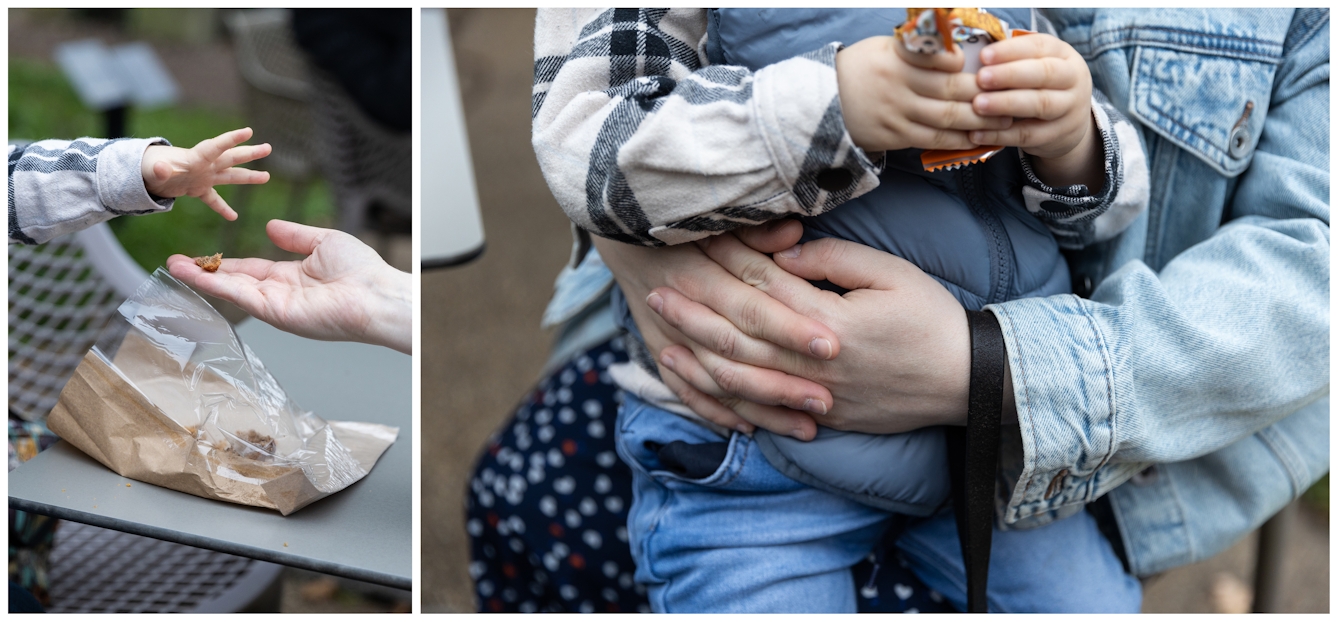
The truth is, my blindness does impact my ability to parent, but not because I can’t see. It impacts me when other mothers won’t sit next to us at playgroups. It impacts me when the librarians gossip, talking about us as I use my residual vision to read you the large print in ‘That’s Not My Dinosaur’. It impacts me when they try to turn us away from soft play because of Ava.
When you were younger, people asked in disbelief, “Is that your baby?” Now they turn to you and coo, “Aren’t you doing a good job looking after Mummy?”
But as we emerged from the newborn chaos, I increasingly realised that I wasn’t frightened of you being blind.
At nine months old, in a stuffy eye-hospital clinic, I watched you go through tests that were tortuously familiar. After the longest 10 minutes of my life, the doctor merrily declared, “He’s normal. I mean, he’s not like you.”
He’s normal.
After battling all that internalised ableism, fear and potential guilt, in that moment I was disappointed.
I know society would expect me to be relieved, and in a way I was. I am relieved that you will be able to drive a car if the future involves driving cars. I’m relieved no one will turn you away from a restaurant because you have a guide dog.
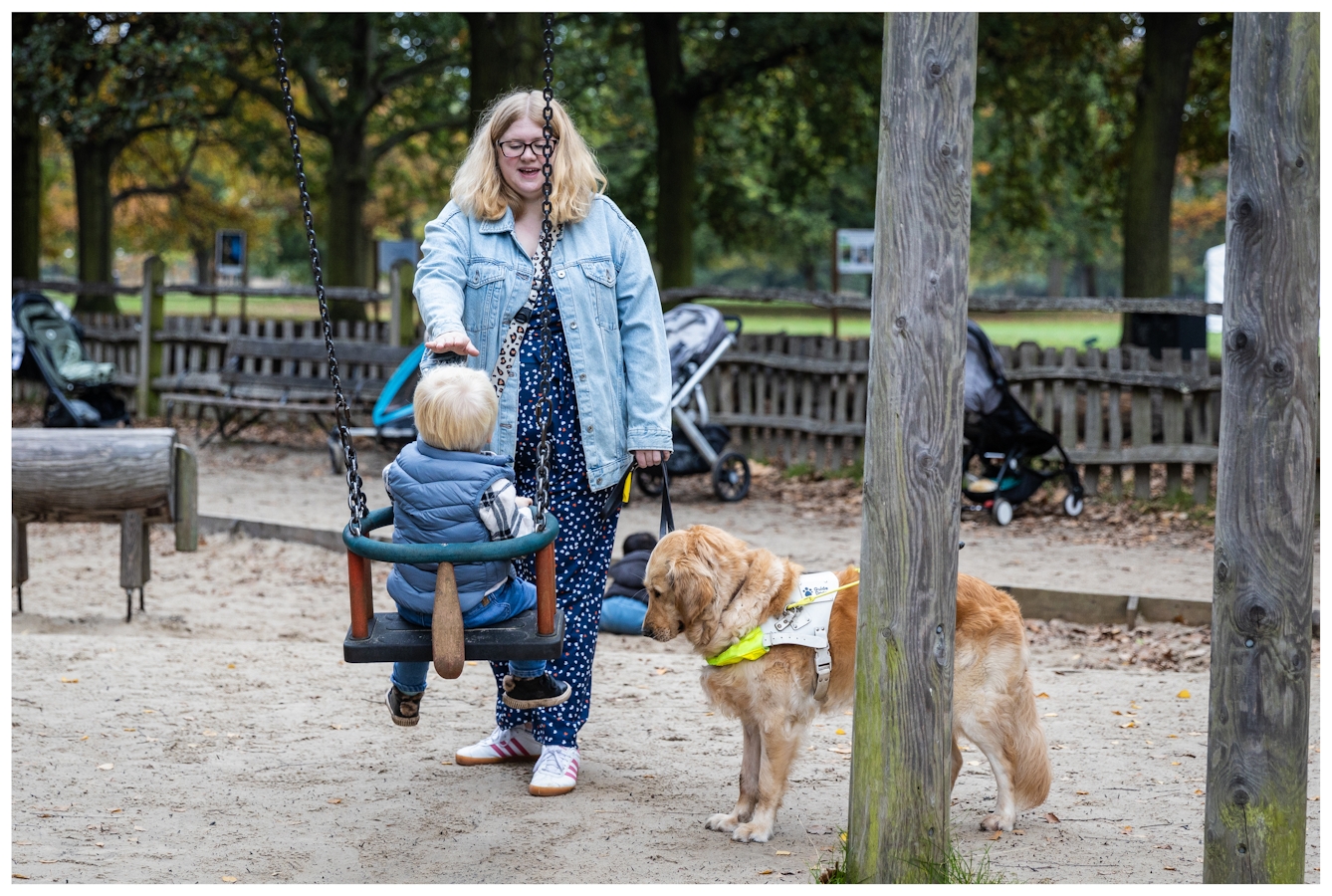
Of course, no parent wants their child to experience illness or pain. I’ve sat by your cot into the early hours of the morning because you had a temperature. Relying on touching your feverish chest to ascertain if it was getting worse before risking waking you up with the talking thermometer. At the same time, getting absolute confirmation that you will experience the world differently from me was difficult to process.
I know it’s right and healthy that children are different from their parents. I grew up around kids who were forced into identikit lives by their mums and dads – same schools, same sports, same careers. Deep down, though, even the most broadminded parent wants their child to be like them, just a bit.
So yes, I am sad I won’t teach you how to navigate stairs using the sensitivity of your feet. I will wonder what it would’ve been like to buy you a tiny white cane to tap your way to school. I expected us to share a blurry worldview.
The doctor was wrong, though: you are like me.
You love stories, your sense of humour is surreal, you’re confident, you like meeting new people and making them smile. You’re kind, and worry when others are upset. You’re determined to the point of stubbornness and, of course, you also have icy-blue eyes.
We already share so much, even though it’s taken me time to see it.
Although you don’t experience it, blindness has shaped who you are because it has shaped me. I can’t wait to keep meeting the person you are becoming. I’m so excited for you to tell me about what you see.
About the contributors
Amy Kavanagh
Dr Amy Kavanagh is an award-winning disability activist and access professional. Amy is committed to celebrating disability, mobility aids and encouraging others to learn about the social model of disability. Amy advocates for disability equality and access in a wide variety of sectors. This includes public transport, digital inclusion, violence against women and girls, museums and the arts, LGBTQ+ rights and employment equality. She also uses social media to share her lived experience navigating the world as a blind Londoner and parent alongside her guide dog, Ava.
Shona Louise
Shona Louise is a theatre, live events and portrait photographer working across multiple industries. As a disabled photographer she has a particular interest in capturing positive representations of disability through portraits. Shona’s work can be seen across West End, Off West End and regional theatres and she particularly enjoys working with disabled-led theatre companies. She also recently had her work exhibited at Riverside Studios in London. Shona lives in Reading and works in London, as well as across the UK.
